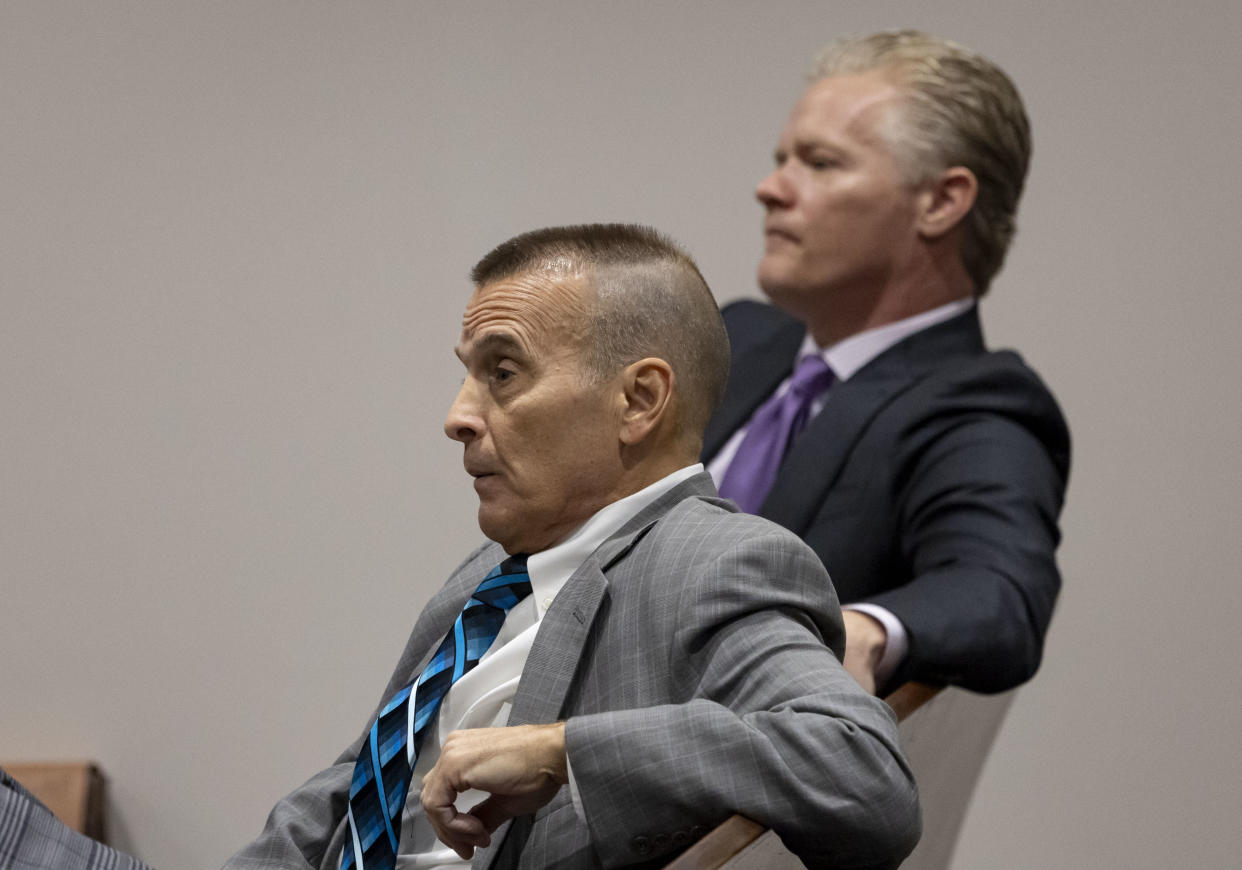Appellate ruling means trial of former Cook assistant state’s attorneys can restart

An Illinois appeals court reversed a trial judge’s decision that sharply criticized Cook County State’s Attorney Kim Foxx’s office and prohibited large swaths of testimony in a case against two former assistant state’s attorneys accused of misconduct.
The appellate court’s nearly 50-page decision marks a blow to the defenses of Nicholas Trutenko, 69, and Andrew Horvat, 48, paving the way for their case to resume after a rare mid-trial appeal halted proceedings late last year.
The men are accused of wrongdoing in connection with the third trial of Jackie Wilson, whose infamous case was critical to unveiling systemic practices of torture within the Chicago Police Department.
Trutenko is accused of lying on the stand during Wilson’s 2020 retrial about details and conversations surrounding a relationship with a critical witness. Trutenko at the time was represented by then-Cook County assistant state’s attorney Horvat.
The indictment alleged that Horvat asked a special prosecutor not to ask Trutenko about that relationship and failed to disclose that Trutenko “had concealed information” about it. Trutenko is charged with perjury, official misconduct, obstruction of justice and violating a records act, while Horvat is facing charges of official misconduct. Both men have pleaded not guilty.
In their recent ruling — released just 10 days after oral arguments — appellate judges described the four-decade Wilson case as a “long and often regrettable chapter of local legal history.” The saga traces back to the 1982 slayings of Chicago police Officers William Fahey and Richard O’Brien, who were shot by Wilson’s older brother Andrew during a traffic stop.
Special prosecutors handling the Trutenko and Horvat cases sought the appeal last year after Lake County Judge Daniel Shanes, who was assigned the case after the entire Cook County judiciary was recused, barred large portions of testimony from a key witness, Paul Fangman, an assistant state’s attorney in the office’s civil actions bureau.
The special prosecutors argued Fangman did not represent Trutenko in a personal capacity, but rather was a lawyer working on behalf of Foxx’s office. Attorneys for Trutenko, though, contended Fangman should be barred from certain testimony due to attorney-client privilege, which protects conversations between lawyers and their clients.
The appellate court disagreed. During oral arguments held last month, a panel of judges appeared skeptical of Shanes’ ruling and of the arguments by Trutenko’s attorneys that claimed privilege for the longtime assistant state’s attorney, frequently asking about the fact that Fangman was obligated to disclose the conversations he had with Trutenko to his superiors.
Shanes did not bar Fangman from testifying, but outlined several reasons, in addition to the privilege issue, why large swaths of his testimony would not be admitted. The appellate court in its June 28 decision overturned many of those reasons, as well, saying the trial judge’s decision limits “the state’s potential use of this evidence to a degree that truly hobbles its case.”
“And it is equally a matter of fundamental principle: a government lawyer’s duty is to serve the public’s interests, including its compelling interest in exposing official wrongdoing,” the written ruling stated. “A public official may not use a government lawyer to shield evidence of his alleged wrongdoing in office from the People themselves, as represented by the criminal process.”
Judges also emphasized they were not commenting on “the truth of this evidence or binding the trial court to any factual findings whatsoever” regarding the defendants’ innocence.
In a statement to the Tribune, special prosecutor Lawrence Oliver II on Monday applauded the ruling.
“We are grateful for the careful consideration and thorough opinion provided by the appellate court in granting our requested relief,” Oliver said. “We look forward to resuming the trial court proceedings.”
The appellate ruling also vindicates Foxx, who came under harsh criticism from the trial judge. In accusing Fangman of violating attorney-client privilege, Shanes in November said he was “shocked” by the office’s actions and the situation undermined “confidence in the law.”
Judges did not mention Foxx by name in their ruling but they did go to great lengths to explain why her office handled the matter properly.
“I think she has been vindicated. I think the office’s position has been vindicated. And I think the judge’s critical remarks have been pretty much thrown out,” said Joel Bertocchi, a private practice attorney who intervened and argued on behalf of the state’s attorney during the appeal.
Attorneys for Trutenko did not immediately respond to a Tribune request for comment. Attorney Terry Ekl, who represents Horvat, declined to comment.
Jackie Wilson, then 21, was behind the wheel of the car and was accused of being the getaway driver during the 1982 fatal traffic stop. Wilson has acknowledged fleeing the scene with his older brother, Andrew, but he has said he did not know Andrew intended to harm the officers.
Jackie Wilson was later convicted of O’Brien’s murder and acquitted in Fahey’s slaying. He spent more than three decades in prison before charges were dropped at his third trial in 2020; he later received a certificate of innocence. In March, the Cook County Board voted to award him a $17 million settlement as part of his federal civil rights lawsuit.
Wilson attended much of the proceedings last year against Trutenko and Horvat. On Monday, he told the Tribune he is pleased with the appellate decision and is glad the trial will proceed.
“It’s a shame that the (special) prosecutors had to go before the appellate court to get justice in a situation like this,” he said. “The ruling shows me that there is still some justice in Illinois’ criminal justice system.”
Chicago Tribune’s Stacy St. Clair contributed.

